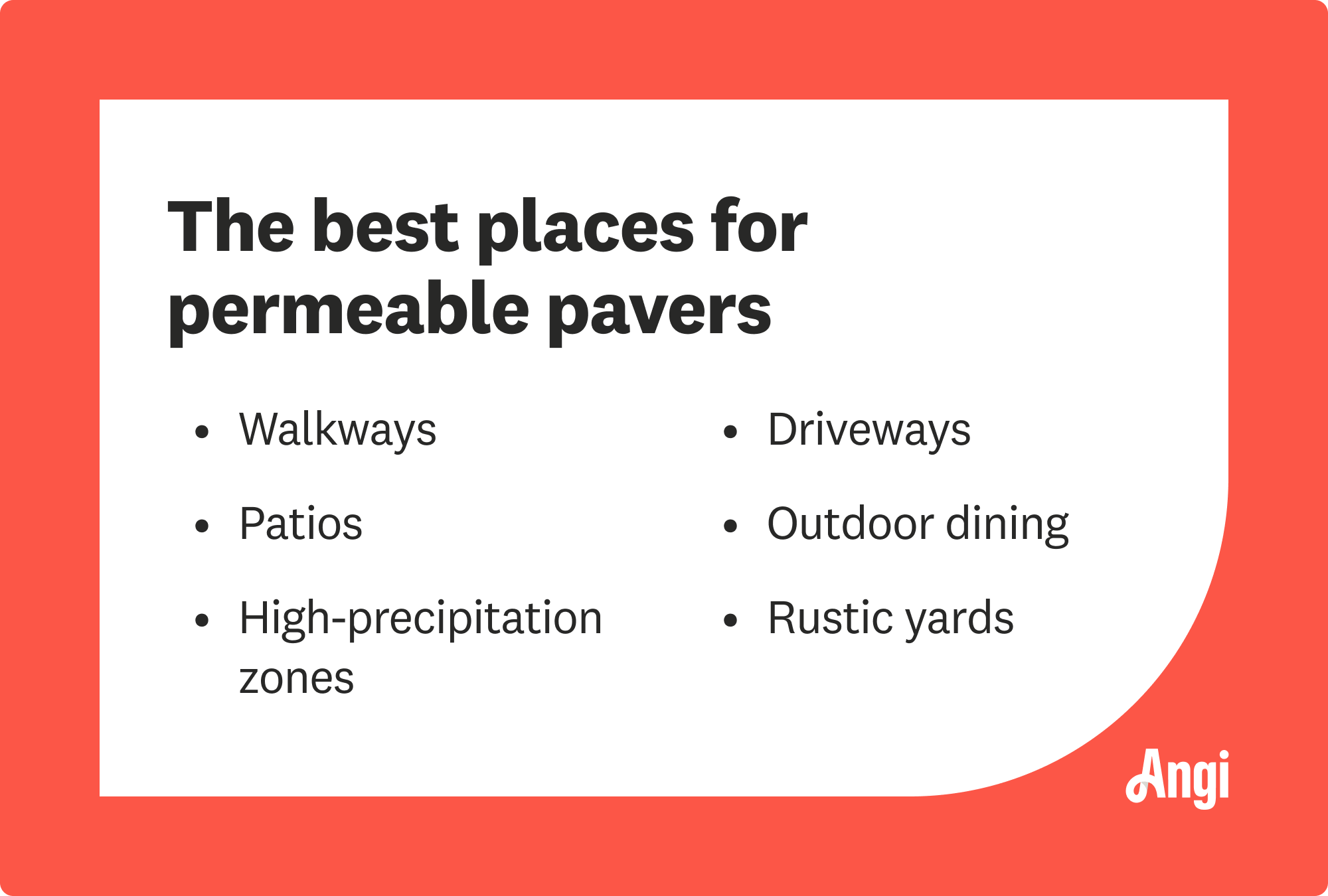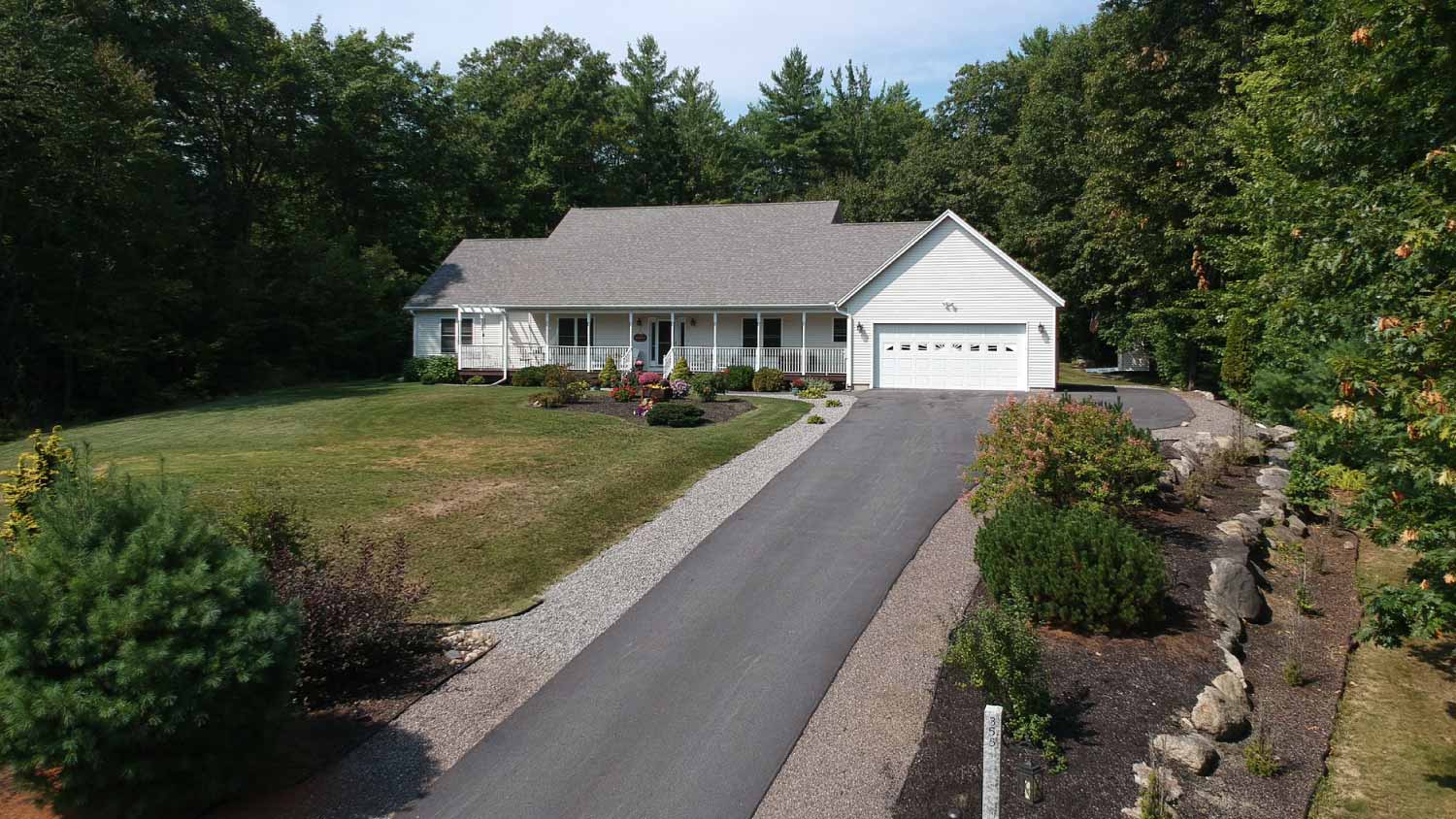What Is Permeable Paving? Everything You Need to Know
Paving the way to a more eco-friendly and flood-safe future


Permeable paving is an alternative to traditional pavement that reduces stormwater runoff.
This type of pavement can reduce water pollution and prevent flooding.
Permeable pavers may also discourage pests, improve your home’s aesthetic, and even qualify for tax rebates.
Permeable pavers are more expensive to install, and the labor required is too challenging for most homeowners to DIY.
Most of us want the exterior of our home to offer enough green space to connect with nature — a yard to play with the dog in, a garden for flowers and fresh veggies, a good tree for a tire swing or shade to sit beneath when reading a book. But the reality is that our exterior also requires a lot of concrete and asphalt, from driveways and walkways to patios and outdoor kitchen areas. And these all send stormwater runoff into our community’s storm drains or (worse) the foundation of your home.
Permeable paving offers an eco-friendly alternative to traditional pavement. These pavers allow rainwater and snowmelt to flow directly into the ground as they would in a yard. This slows down the flood of water toward your home and keeps chemicals, fertilizers, bacteria, rock salt, and other harmful materials out of our local waterways.
What Is Permeable Paving?
Permeable paving is an alternative to traditional pavement materials that directs the flow of rainwater and melting snow into the ground, rather than to public stormwater drains. This means harmful pollutants we use around our house, such as fertilizers and rock salt, aren’t diverted to our storm drains; according to the Environmental Protection Agency, this is a great way to reduce water pollution.
In some cases, driveways and walkways send rainwater and snowmelt into your garden or toward your home’s foundation, which can have long-term negative impacts. Permeable paving can help discourage this.
Permeable pavers can either be made from:
Brick, cinderblock, natural stone, or plastic tiles, with space within for gravel, stone, sand, or grass that allows water to filtrate into the ground
Pervious concrete and pervious asphalt, which are porous enough to let water filter through in ways it cannot with traditional concrete and asphalt
Pros and Cons of Permeable Pavers
Largely, permeable pavers are a big win for your home and the environment, but there are also some downsides to consider. Let’s take a look at the pros and cons:
Pro: Permeable Pavers Reduce Water Pollution and Flooding
The foremost reason to install permeable paving at your home is that it can help reduce water pollution. When you install permeable pavers, chemicals, fertilizers, rock salt, and other harmful materials are less likely to filter into storm drains. This makes permeable paving one of the most eco-friendly driveway solutions.
Plus, you’re less likely to flood your yard when you install permeable pavement. This is also helpful for storm drains in your neighborhood, which can also overflow during heavy rainfall and flood surrounding areas.
Pro: Permeable Paving Can Protect Your Home and Garden
Water runoff from rainstorms and melting snow can make its way into your garden or, worse, toward your home’s foundation. This can lead to serious issues over time; foundation repair costs an average of $5,150.
If you’re really worried about flooding your yard or your home, the ultimate solution is a mixture of permeable pavers, a sump pump, and a French drain system.
Pro: Permeable Paving Can Make Your Space Feel More Natural
If you have limited outdoor space, you can maximize the natural feeling by using pavers with gravel, sand, or even grass. This brings more nature into your outdoor space and has a nice rustic aesthetic.
Note: Pervious asphalt and concrete won’t have this same effect.
Pro: Permeable Pavement May Qualify for Rebates
In some cities, permeable pavement may be eligible for rebates and tax incentives, meaning you’ll recoup some of the installation cost. The size of the rebate varies, so check with your municipality; in some cases, homeowners earn up to $15 per square foot.
Pro: Permeable Paving Help With Pest Control
If you live in an area with a lot of rain, pooling water running off your patio or driveway could lead to puddles and soggy yards. This is an ideal breeding ground for pests, including mosquitos. By filtrating water into the ground with pavers, you may be able to reduce pest problems around your home.
Con: Permeable Pavement Is Expensive to Install
Installing permeable pavement for a driveway, patio, walkway, or other surface is more expensive than traditional pavement. The materials themselves are more expensive, but the labor is more involved.
Con: Permeable Pavement Requires More Maintenance
You’ll have to stay on top of maintenance for your permeable paving. If the paving includes grass, you’ll need to cut the blades when you mow the rest of your lawn. For pavers with gravel and sand, you occasionally need to clear out debris that can build up and block the space between pavers.
Con: Permeable Pavement May Have a Lower Load Capacity
Some permeable pavement may not be as durable as traditional driveway and walkway materials, like concrete and asphalt. If you expect heavy traffic, particularly by vehicles, look into a more durable permeable paving material.
Cost of Permeable Paving
The cost to install a paver driveway runs from $10 to $70 per square foot—but permeable paving is the most expensive, meaning you’ll need to budget on the higher end of that range. In fact, permeable paving for a driveway can be 7 times the cost of traditional concrete.
The cost to install a patio also goes up when you choose permeable materials over concrete or brick. Expect to spend between $10 and $30 per square foot.
Installing Permeable Paving
Still unsure if permeable paving is the right choice for your driveway, patio, or walkway? We’ll explain where it makes the most sense and how to install it.
Where to Install Permeable Paving
Permeable pavers are especially great to install in:
In cities and areas where you qualify for a tax rebate
In areas that are prone to heavy rainfall and snowfall (it’s one of the best driveway materials for cold weather)
Permeable pavement is also great for smaller projects, like walkways, patios, and outdoor dining areas. Smaller projects are more affordable but can still help reduce your impact on storm drains.

Who to Hire to Install Permeable Paving
Installing permeable pavers requires specific expertise, tools, and skills. We highly recommend hiring a highly rated paving company near you to handle this installation. While it’s possible to install pavers yourself, permeable pavement is a little more nuanced than other types of pavers and is better left to the pros.
For instance, when installing permeable paving, you have to excavate deeper to add a layer of stone aggregate. You’ve also got to test the density and makeup of the soil below to ensure stability and proper filtration.
Plus, installing the pavers in an even, predetermined pattern requires precise work and a lot of patience.
Frequently Asked Questions
An example of permeable paving is a set of cinder blocks or natural stone pavers with room inside for natural materials, such as gravel, sand, or grass. You can also design these pavers with brick or plastic tiles.
In addition to these pavers, permeable pavement can be obtained by using a highly porous material, such as pervious concrete or pervious asphalt.
Permeable paving is a good option for a lot of reasons. It can help prevent flooding, keeps harmful chemicals from polluting our water, and can divert water away from your home’s foundation. Plus, it can add a rustic aesthetic to your outdoor area, might prevent pests who breed in water, and may even qualify for tax rebates.
Yes, permeable paving is expensive. For driveways, expect to pay up to $70 per square foot; for patios, permeable paving can cost up to $30 per square foot. Costs will depend on the type of material you choose, plus the standard labor rate in your area.



- 5 Best Driveway Material Options and How to Choose the Best One
- How to Lay Pavers Like a Pro and Create Your Dream Outdoor Space
- Deciding Between Concrete, Stone, or Brick Pavers? Pros, Cons, and Cost Compared
- What Are Pavers and How Do They Help Build an Outdoor Paradise?
- Installing Pavers? Here’s What You Need to Know About Drainage
- Pavers vs. Concrete: Which to Use for Your Home Project
- What Are Interlocking Pavers?
- The Ultimate Guide to Pool Deck Pavers
- How to Stop Tree Roots From Lifting Pavers: 10 Tips
- 31 Paver Patio Ideas to Turn Your Backyard Into a Showpiece Oasis












